
Life
Far from faraway
‘The food on your plate embodies a commitment to place’ are the first words I read on the menu. Outside Fogo Island Inn’s dining room, the wild Atlantic Ocean crashes over rocks carved by the sea for the past 400 million years. Inside, fishing rope chandeliers cascade from the soaring ceiling of one of the most dramatic buildings on the planet. A profound juxtaposition, yet both outside and in represent the beauty of simplicity.
Fogo Island is an ‘island off an island’. Big brother Newfoundland (together with Labrador), Canada’s most easterly province, is nicknamed ‘the rock’ for its vast tracts of granite, making Fogo (population around 2,200), a pebble. As it’s closer to Dublin than Vancouver, from the late 17th to the early 19th centuries, Fogo attracted immigrants mainly from Ireland, Scotland and England, who braved the Atlantic crossing for one thing – cod. The fish was to Newfoundland as gold was to Australia. However, with the introduction of super-trawlers in the 1960s, and the Canadian government’s ban on cod fishing in 1992, many of Fogo Island’s jelly-bean painted ‘saltbox’ houses were boarded up. The ‘stages and flakes’ – tiny wooden structures perched on spindly stilts over the water where the fish was dried and processed – began to crumble. And fall.
Build it and they will stay
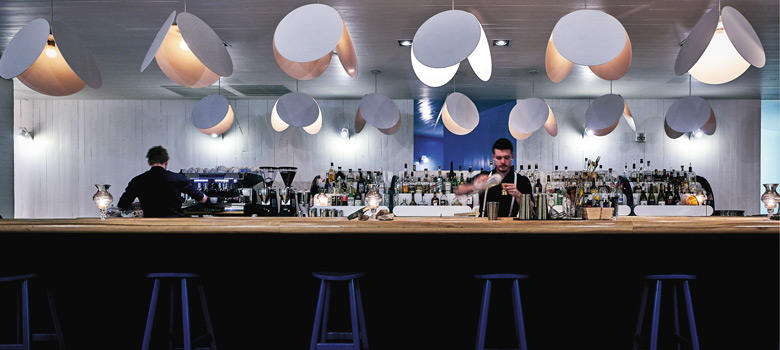
“Many of my generation had to leave,” says Roy Dwyer in an almost hypnotic Fogo/Irish lilt. “My family came here from Ireland in the 1770s. Fishing was all we knew. I went to university, but all I wanted to do was return to my roots.” As a historian, storyteller and guide at the Inn, Roy and many of his peers now enjoy a different type of life. All thanks to the Inn’s founder Fogo-born Zita Cobb who, after making her fortune in a fibre-optic equipment company, came back, to give back.
More than an architectural masterpiece, Fogo Island Inn shows what’s possible when someone cares about the planet and its people. Via the non-profit Shorefast Foundation, Zita and her brothers run the Inn as a ‘community asset’ with 100% of surpluses reinvested to the shareholders – the Fogo Islanders.
Opened in 2013 and built on sustainable values (right down to ethically sourced nails), all the furniture and soft furnishings are made on the island by local artisans. From traditional rocking chairs to exquisite hand-sewn patchwork quilts, wooden coat hangers, crocheted cushions and hand painted wallpaper, it feels like a happy mix of grandma’s house and art gallery.
“Skills that were nearly lost are now thriving and our young people can stay home and build a future,” Roy says.
And it’s not only the Islanders who are part of this renaissance.
Seven Seasons
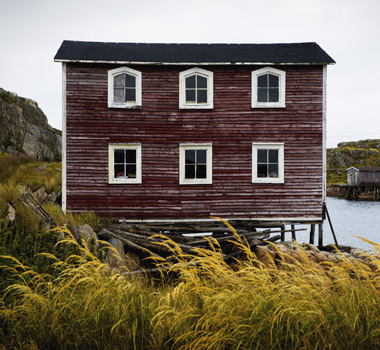
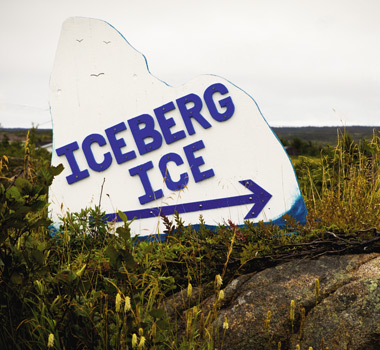
“Even as a Newfoundlander, Fogo Island is special,” says Jonathan Gushue, executive chef at the Inn. “Being able to make a connection with the ingredients is what drew me here. I can look out one window and there’s the lamb, another for the vegetables and, of course, the ocean brings us many riches.”
The desolate landscape defies its potential bounty. From sea cucumbers to a shoreline leaf that tastes like oysters, caribou moss and berries with wildly romantic names like marshberries and cloudberries, it goes without saying that everything served at the Inn is made right here.
“Zita wants people to feel like this is their home, for the food to be straightforward,’ Jonathan says. “It’s sometimes hard for a chef to pull back, but it’s the smartest way, because nothing gets confused or lost.”
The menu changes daily, ebbing and flowing with the seven Fogo seasons – winter, pack ice (when ice-floes float past), spring, trap berth (when fishing grounds are staked out), summer, berry and late fall.
Being here in the berry season, the small, juicy bundles of joy turn up unexpectedly. Who knew blueberry bread was a thing, or that chanterelles dressed with blackberries and gouda was so heavenly? And nothing speaks Fogo more than the delicate flavour of cod. I try it several ways – poached with squid, peppers, basil and fennel, cod tongues with leeks and new potatoes, cod cheeks with quail breast and egg and smoked cod with cucumber and yogurt. Other ‘best ever’ dishes: hen ravioli with sunflower broth; spiced baby carrots (how can a humble carrot taste so amazing?); braised lamb belly, and every dessert on the menu.
The extensive wine list is curated from vineyards in France, Italy and Canada and wine pairings are suggested for each dish. Red highlights include Bouchard Père & Fils, Borrowing Owl, and Villa Antinori and white wise, the Domaine Michelot, Jost, and Santa Margherita and for special occasions, Moët & Chandon.
Fogo might not make wine (yet), but the next best thing for local flavour is the playful cocktail list with drink names like ‘respect your elderflower’ and ‘rum with a view’ or my favourite – ‘seagroni’ that features seaweed gin from The Newfoundland Distillery Co (the first distillery to open in the province in the last 100 years) and tastes as earthy as it sounds. Very Fogo.
Beyond the inn
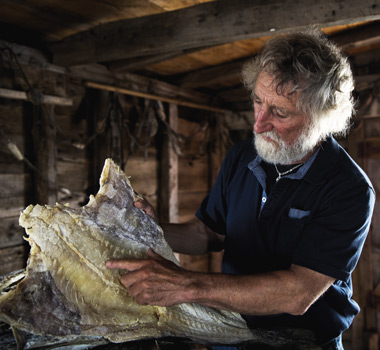
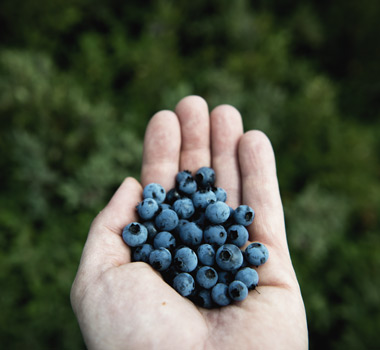
Although it would be easy to stay cocooned in the Inn, there’s plenty to explore further afield. Activities can be organised or not, guided or not, strenuous or not. One morning I hike over the hills gathering berries, another I poke around the fishing stages of Tilting, a beautiful preserved traditional fishing village or sometimes I just sit on the rocks and stare at the ocean. Roy takes me on a tour of the art galleries and studios dotted around the island and another day he invites me to his home to dig up carrots and meet his wife.
And in true Fogo hospitality, there’s cake.
“You’ll find this cake in every Fogo home,” says Christine. “As soon as we finish one, I cook another in case someone drops in.” Laced with molasses and sweet spices, after one bite of Christine’s boiled raisin cake, I’m hooked. Not just because it’s moist and scrummy. It’s the feeling of warmth that radiates from a culture that runs as deep as the Atlantic. And I’m not alone.
Come from aways
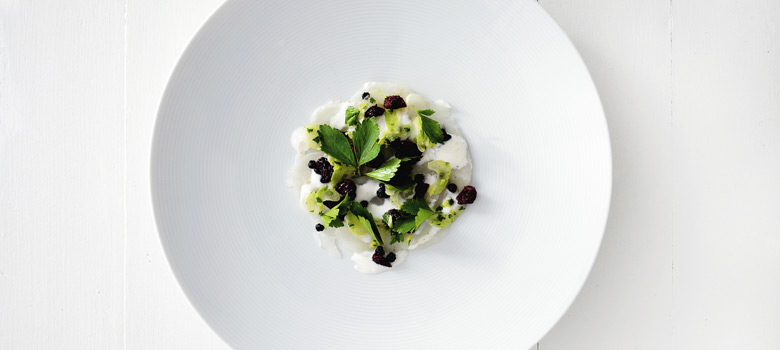
“A few years ago I applied for a summer job in the kitchen at the Inn,” says chef Ian Sheridan, originally from Toronto. “I’m now a Newfoundlander by choice.”
While working his way up to sous chef, he met and fell in love with his partner in life (and business), Caitlin Terry. Together they opened Bangbelly (Newfoundland English for a pudding originally prepared by fishermen made with flour, molasses and salted pork), a funky daytime café in the island’s only ‘almost main street’ in the township of Fogo.
“Zita’s vision is for people to branch out – to be the best they can be,” Ian explains. “We looked to bring something new to the island – a place to pop in for great coffee and a chat.”
In a short time, Bangbelly has become a go-to place for both locals and visitors.
Scoff (Newfoundland for food) is another thriving new restaurant. Established by super duo Celine Parfitt and Bryce Degner, it’s a casual set-up in a building owned by Shorefast.
“We’re from different parts of Canada, but it didn’t take long before we knew we wanted to stay,” says Celine. “When I worked at the Inn, I’d watch guests leave crying and hugging people. The island is life-changing. It has magical qualities.”
Sourcing locally and making everything from scratch, the menu focuses on Newfoundland comfort food with a twist.
Over traditional ‘fish and brewis’ (salt cod with hard tack) served with scrunchions, onions, crème fraiche and mustard pickles and local herring on toast, we chat about the impact Fogo has on people and how Zita is helping them realise their dream.
“Zita sat Bryce and I down together with Ian and Caitlin and taught us how to run a business. She even lent us her accountant,” Celine says. “And anytime we can come up with the money to purchase the building, the foundation will sell it to us.”
Six years after Fogo Island Inn first opened, Scoff and Bangbelly are testament to the pay-it-forward philosophy of Zita Cobbs and the Shorefast foundation.
In a world of clutter, even a few days on this island is a deeply moving experience that questions what’s important in life.